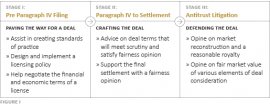
Within the situation of Federal trade commission v. Actavis, Corporation., 133 S.Ct. 2223 (2013), the U.S. Top Court held that reverse payment pay outs may violate U.S. antitrust laws and regulations even when the agreement’s anticompetitive effects fell inside the scope from the exclusionary potential from the patent-in-suit. Subsequent Federal court opinions have established that such potential violations aren't restricted to financial reverse obligations.1
The Actavis Court adopted a “rule of reason” method of evaluate settlement contracts, and hang forth five factors to look at in identifying whether such contracts produce anticompetitive effects. These 4 elements include financial and economic evidence concerning, amongst other things, the fair worth of the glory provided to generic businesses that challenge the validity of the patents.
Within the situation of In re Nexium Antitrust Lawsuit (2014 WL 4370333) the U.S. District Court for that District of Massachusetts applied the Actavis factors in the evaluation of three settlement contracts. In every agreement, the generic challenger decided to delay market entry their product. In the Summary Judgment opinion, the Nexium Court addressed the fair value and potential anticompetitive impact from the non-financial consideration extended to those generic firms. The glory incorporated:
- A avoid creating an Approved Generic (AG)
- Distribution privileges for other drugs
- Supply contracts
- Favorable settlement terms inside a different Hatch-Waxman dispute
- A avoid appealing another Hatch-Waxman dispute
Our Abilities and Expertise
Sea Tomo’s extensive Hatch-Waxman lawsuit experience in addition to our experience pricing intangible assets and ip make us distinctively capable of assist pharmaceutical firms trying to adhere to Federal trade commission rules and U.S. antitrust laws and regulations because they negotiate Hatch-Waxman-related contracts.
The financial and economic talking to services we provide both top quality and generic firms depend, simply, around the procedural position of either the Hatch-Waxman lawsuit or even the ensuing antitrust action(s). Figure 1 below demonstrates our economic and financial services at three different stages of those court proceedings.

STAGE I: PRE-PARAGRAPH IV CERTIFICATION
Based on the Actavis court, "[a] valid patent excludes all except its proprietors from using the protected process or patent. But an invalidated patent carries by using it no such right."2
RELATED VIDEO












